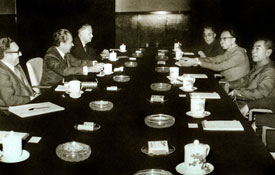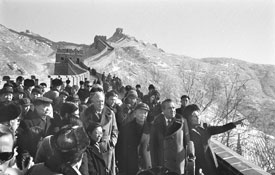|
 |
 |
|
EXCHANGE: Premier Zhou Enlai (second right) talks with U.S. President Richard Nixon about the Sino-U.S. Joint Communiqué in Shanghai on February 28, 1972 (CNSPHOTO) |
SCALING NEW HEIGHTS: U.S. President Richard Nixon visits the Great Wall in Beijing on February 24, 1972 (XINHUA) |
During the negotiations, much time had been spent on wording. At that time, phrases such as "anti-imperialism," "countries want independence," "nations want liberation" and "the people want revolution" were commonly used as slogans in China. Kissinger said if the phrases were used in the communiqué, it would be like the U.S. president coming to China for legal judgment. He especially disliked the word "revolution" in the phrase "people want revolution" and suggested using "justice" instead. Later, the two sides agreed to use "progress" after hot debating.
Considering the domestic situation at the time, a little change of the widely used slogan might cause a sensation in China. The Chinese side later proposed to reuse the phrase "the people want revolution." In order to persuade Kissinger, Vice Foreign Minister Qiao Guanhua even quoted U.S. history. Qiao said American people should not be afraid of revolution, because they call the American War of Independence a revolution. Then the U.S. side accepted the saying.
Another controversial word was "acknowledge." In the English version of the communiqué an article says: "The United States acknowledges that all Chinese on either side of the Taiwan Strait maintain there is but one China and that Taiwan is a part of China. The United States Government does not challenge that position." At first, we thought the word "acknowledge" was not suitable here and insisted replacing it with "recognize." But the U.S. side stood fast. After consulting the dictionary dozens of times, we accepted the word.
The official negotiation process of the Shanghai Communiqué was pretty hard during Nixon's visit. The two sides, headed respectively by Qiao and Kissinger, had in all 11 rounds of talks during seven days.
At that time, the common goal of the two sides was to open the door to the normalization of bilateral relations. No topics about establishing diplomatic relations were referred to in the negotiations. However, to improve bilateral relations, the two sides needed to make progress on the Taiwan question. The Chinese Government insisted that the United States should withdraw its forces from Taiwan because its military presence on the island was a breach of China's sovereignty. But the U.S. side claimed that the withdrawal of U.S. forces must be linked with the peaceful settlement of the Taiwan question. China regarded the precondition as interference in our internal affairs. After fierce debates, the two sides agreed on the following statement, "It (the United States) reaffirms its interest in a peaceful settlement of the Taiwan question by the Chinese themselves. With this prospect in mind, it affirms the ultimate objective of the withdrawal of all U.S. forces and military installations from Taiwan."
What's the significance of the Shanghai Communiqué for the later Sino-U.S. relations and the development of the whole international pattern?
Ding: After the issuance of the Shanghai Communiqué, the Sino-U.S. relationship entered a new stage. Though bilateral ties went through ups and downs, the United States has not given up the principles included in the communiqué, especially the one-China principle. If the United States had given up the principle, the basis of the Sino-U.S. relationship would have been gone. From the global perspective, Nixon's visit changed the triangle relations between China, the United States and the Soviet Union, which is of great significance to international relations. After that, many Western countries began to improve relations and established diplomatic relationships with China.
|
